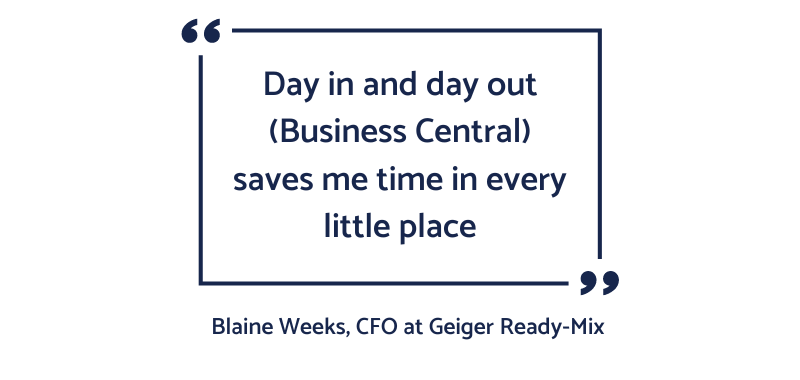
For five generations the Geiger family has provided the Kansas/Missouri area with quality building materials. Today Geiger Ready-Mix employs 250 workers spread out over 6 locations and 10 concrete plants.
They produce 80,000 cubic yards of ready-mix concrete every month and deliver 11,000 truckloads to customers across the lower Midwest. Delivering on customer orders in a timely manner is key to the company’s continued success.
“That’s our world — taking concrete orders and then delivering that concrete to customers,” said CFO Blaine Weeks.

Catalyst to cloud ERP migration
Ever mindful of improving delivery services, Geiger participated in the Bulk Construction Materials Initiative (BCMI). A group of building materials producers and contractors provided input on cloud software custom designed for the construction and concrete industry.
It was time to make the switch to the new BCMI dispatching software that had been designed based on their feedback. That became the catalyst to a larger software implementation project.
“Before we could implement the one new app and platform, we had to build the foundation with ERP. That look a lot of time and a lot of integrations in Business Central,” Weeks said.
Geiger started with a design document, exploring their business processes and what an ERP that integrated with BCMI would need to look like and do.
The Kansas-based company had been on Microsoft Dynamics SL since 2015 and had no issues with its on-premise ERP. However, initial conversations with their Microsoft partner, Boyer & Associates, indicated that integrating BCMI with Dynamics SL might not be their best option.
The company needed to be able to invoice and post payments easily while integrating seamlessly with the new BCMI software. For Weeks, the sales order creation process and Accounts Receivable module in Microsoft Dynamics 365 Business Central made the biggest difference.
“It felt like Business Central was just a good fit for us and what we were trying to do,” Weeks said. “I was very comfortable with Boyer (even though) I didn’t know a lot about the product.”
Boyer’s demos of Business Central showed that the cloud ERP would work well for Geiger’s needs and integrate smoothly with their other systems.

Live with Microsoft Dynamics 365 Business Central
In all the ERP implementation and integrations in Business Central to Geiger’s BCMI software and other systems took 18 months to complete. They went live in September 2023.
“The process was good. The weekly status meetings were well run and kept us on task,” Weeks said.
The biggest challenge throughout the implementation was defining how the complex integrations needed to work. Weeks especially liked the ability in Business Central to create multiple testing environments. This let his team test each proposed integration feature and suggest any needed tweaks before going live with the system.
They went live with Business Central and BCMI at the same time. The Geiger team spent a lot of time the first couple of months cleaning up and validating data between their two new systems. They needed to make sure everything was working properly.
Geiger also signed up for a post go-live Boyer Managed Support plan to assist with any ongoing issues.
“We’ve been pleased with the transition to our ongoing support person … Things seem to work pretty well and when they don’t, they’re readily fixed,” Weeks said.
Daily timesavers in Business Central
“Day in and day out it saves me time in every little place,” Weeks said of Business Central.
With the Microsoft cloud ERP in place, he saves at least one hour of time every week — more during month-end closing.
Weeks said the accessibility of data has been the biggest difference for him and a huge timesaver on a regular basis. No longer does he have to go back and forth between Excel and his ERP system to pull reports. He can go directly to a list within Business Central and set a filter to review the report he needs in real time.
“I can do that so much more quickly now,” he said. “From a matter of verifying data, it’s way faster.” The built-in analysis tools give his accounting team a much clearer picture of their expenses in real time.
He also appreciates the ability to easily correct posted journal entries, a process that was much more cumbersome in Dynamics SL.
The BCMI integration in Business Central — and integrations with the company’s other software systems — works well too, Weeks said. They’ve had a few hiccups with trying to time updates to each of the systems in the right order, but he said Boyer has resolved any issues quickly.
To anyone wondering about migrating from Dynamics SL to Business Central, Weeks said don’t delay any longer.
“I wouldn’t hesitate. I think there’s so much more functionality and accessibility. The ease of which you can get the data to troubleshoot or analyze — To me that’s been the real difference,” he said. “In SL there’s really no analysis. You always had to export it and do the rollups yourself.”







